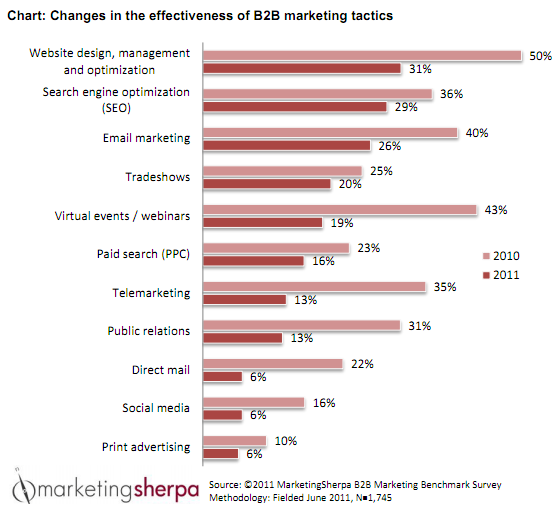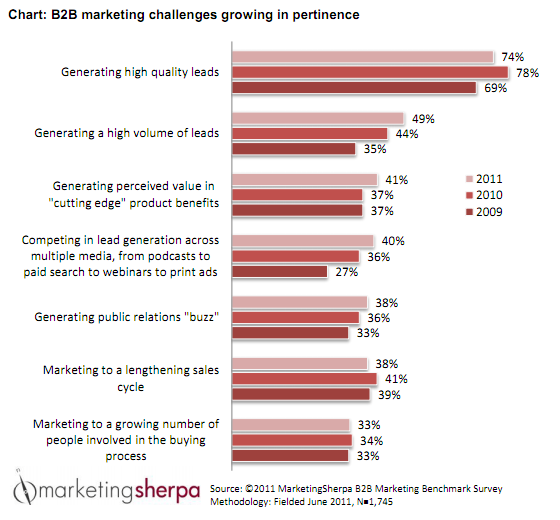4+ Recommendations To Enhance B2B SEO Initiatives
The start of the new year is the ideal time for B2B search engine marketers to reassess website strategy and determine where enhancements could be made to benefit SEO visibility. With budgets still in review and benchmarks being set, focusing on site enhancements first could help maximize the benefits of all ongoing SEO initiatives, that […]
The start of the new year is the ideal time for B2B search engine marketers to reassess website strategy and determine where enhancements could be made to benefit SEO visibility.
With budgets still in review and benchmarks being set, focusing on site enhancements first could help maximize the benefits of all ongoing SEO initiatives, that are realized over the course of the year.
Marketingsherpa just released its 2012 B2B Marketing Benchmark Report and two points helped shape this column. First, B2B marketers experienced severe declines in the tactical effectiveness of two top initiatives, website strategy and SEO.

Second, while the B2B marketing role has not really changed, leading “cutting edge” initiatives and creating buzz continue to grow in priority, along with lead generation initiatives as a whole.
This column provides recommendations for four new site enhancements to consider, which are designed to increase search referrals, improve conversions, and help promote social sharing and link building.
Author Information Tagging
In many cases, part of the B2B marketing strategy is establishing industry thought leadership through content initiatives such as bylines, article development, and blogging.
Enabling the rel=author element on site-specific content provides an excellent opportunity make content stand out in search results, and help establish long-term credibility.
Example via Google Post of author information in search results:
While Google will not guarantee authorship information to appear in search results for the content you create, developing the opportunity to be found is fairly simple.
Via the Google Webmaster Help article, the following steps are required:
- Create a Google Profile.
- Link your content to your Google Profile by way of adding a Google+ icon or manual link from web page
- Link to your content from your profile through the “Contributor To” section
As a new alternative, you can also add your name and email to your content, which Google recommends for sites with content by multiple authors.
Chief among a host of reasons to start developing author ownership is the rapid growth of the Google+ social platform.
With Google merging opportunities to search traditionally and through one’s social networks in one experience, standing out in the crowd with this type of authorship could become a necessity long-term.
Visualizations & Graphics
We’re hearing a similar comment regarding content marketing from clients, “we want more content, but less text”. In other words, messaging strategies that have a greater impact with fewer words and detail.
In some respects, I completely agree and here is why:
- B2B solutions often have a more complex integration. Visualizations help explain process and impact quicker and more effectively.
- We often find image search results for B2B keywords; particularly for more general concepts and methodologies. (Examples here, here, and here)
- Images and graphics can be easier to share via social media, and good visualizations will often get embedded in blog posts and articles from other industry sources.
Example of first page search results for “cloud computing”
It almost seems like a complete “about face” for SEO, however visualizations in conjunction with context can often support keyword strategy and provide opportunities for organic link growth over time.
Social Registrations
Just the other week, Marketingsherpa highlighted a Social Identity study from Janrain, a social Web user management platform provider, in coordination with research conducted by Blue Research.
Among the studies findings, a few key percentages stuck out to me.
- 86% of respondents reported being bothered by the need to create new accounts at websites
- 90% admitted to leaving a website if they couldn’t remember their login details rather than taking the time to recover their login information. This figure is up from 45% in 2010
- 77% responded that social login is “a good solution that should be offered,” with 41% preferring social login over creating a new user account or using a guest account.
In the same way search marketers might argue developing social media assets to be in all the places an organizations customers are active, it also makes sense to offer registration opportunities leveraging the same social media platform credentials.
Even though B2B marketers may be hesitant at losing control of some of the registration information they can obtain, comparable increases in conversion rates and volume need to be considered as well.
According to the Janrain website, many of their customers using their social login solution have experienced 15-50% increase in registration and conversion rates.
Microformats
In the middle of 2011, all three major search engines announced support of Schema.org, which is meant to “support a common vocabulary for structured data markup on web pages”.
While it is debatable whether full blown re-architecture is wise for mature website infrastructure, site owners considering changes should also take into account the adoption of relevant microformat structure.
A recent article from Search Engine Journal highlighted a series of microformats B2B corporate sites could consider. Among some of the great recommendations to consider:
- Site Header Information for corporate logo, global navigation, company name and phone number.
- Site Footer Information for addresses, phone numbers, footer links, navigation and general contact forms.
- Company Leadership Teams can be marked up for identifying titles, descriptions (bios), and bio photographs
Finally, Don’t Forget The B2B SEO Basics
Columns could be rewritten every year refreshing B2B marketers of some of the basics of on-page SEO strategy. In summary, here are some of my top-of-mind tactics.
- Keyword Strategy Development – Every new asset presents an opportunity to be found in search; don’t forget to apply a keyword target.
- Social Sharing Elements – Keep social sharing top of mind by adding relevant social media sharing buttons and link references.
- Landing Page Development – create SEO landing pages for less search friendly marketing assets but that will still provide opportunities for links and keyword visibility.
- Form Submissions and Lead Tracking – create opportunities for lead generation initiatives through short forms when appropriate. Don’t forget to set the goals and conversion tracking as well.
While site optimization alone won’t drive the results B2B marketing campaigns require, they help augment and provide better opportunities for success over the long haul. As B2B search engine marketers get ready to kick off this years initiatives, hopefully these recommendations (and others) help lead to success with B2B SEO in 2012.
Contributing authors are invited to create content for Search Engine Land and are chosen for their expertise and contribution to the search community. Our contributors work under the oversight of the editorial staff and contributions are checked for quality and relevance to our readers. The opinions they express are their own.
Related stories
New on Search Engine Land


